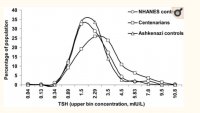- Joined
- Aug 24, 2017
- Messages
- 5,856
An interesting study on some hormones in the people who get very old. They basically found low TSH, normal DHEA:cortisol ratio and normal melatonin, which is important because the DHEA:cortisol ratio along with melatonin decrease with age whereas TSH increases.
Neuroendocrine features in extreme longevity. - PubMed - NCBI
"Centenarians exhibited significantly lower TSH levels together with slightly higher rT3 levels than old controls."
"The cortisol/DHEAS molar ratio, which usually increases with age and is considered to be an expression of a neurotoxic pattern of the steroidal milieu, in the central nervous system, did not show any further increase in centenarians. The urinary free cortisol and aMT6s (melatonin metabolite) excretion declined with age; however only in centenarians and in young controls aMT6s excretion was significantly higher at night than during the day."
Neuroendocrine features in extreme longevity. - PubMed - NCBI
"Centenarians exhibited significantly lower TSH levels together with slightly higher rT3 levels than old controls."
"The cortisol/DHEAS molar ratio, which usually increases with age and is considered to be an expression of a neurotoxic pattern of the steroidal milieu, in the central nervous system, did not show any further increase in centenarians. The urinary free cortisol and aMT6s (melatonin metabolite) excretion declined with age; however only in centenarians and in young controls aMT6s excretion was significantly higher at night than during the day."

